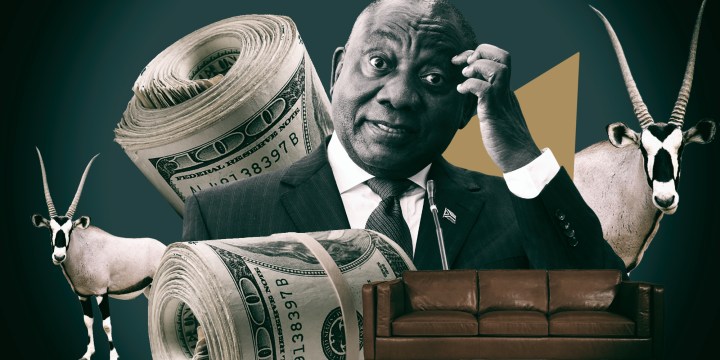AFTER THE BELL
Anyone game for some Cyril-hunting?

Sometimes the name of a company is so compelling that it is its own justification for starting a business.
As everyone who has visited a game reserve knows, impala are the pigeons of the veld: ubiquitous, ordinary and underrated. You stop once to look at them, but never again. There are just so many of them.
But there was a stage when black impala suddenly became very popular, especially with hunters. Black impala are, well, black, from tail to ear tip. They are not a subspecies, but a colour phase of the southern impala, and they were developed by selective breeding.
One of the reasons impala are ubiquitous is because they are tough, and as one game guide once told me with respect and pride in his voice, “they are very well adapted”, which is game guide-speak for all-round excellence and admiration.
So, black impala have the advantage of being easy to breed and easy to maintain while being very valuable. Some friends and I talked loosely about investing in some of these animals. I should be clear, these discussions took place at the pub, so an immediate listing on the New York Stock Exchange didn’t seem imminent. However, we did toy with names for our new venture, and my wife came up with Black Economic Impalament. Now, be honest, would you or would you not invest in such a company just on the basis of the name?
Fortunately, we didn’t, and the price of black impala fell as propitiously as it had climbed. Clearly, there are fashions in hunting, the same as there are fashions in knitted sweaters. Still, the price difference is notable. It will cost you about $450 to hunt an ordinary impala of respectable size, but a black impala will set you back $2,500.
The price of the game is, of course, a talking point at the moment because our President, Cyril Ramaphosa, did or did not accept a bundle of dollar bills for an unspecified number of red oryx and other game. Rather like black impala, the red oryx is pretty rare and could conceivably be sold for a lot more than the ordinary grey oryx, also known as a gemsbok. But that much more?
The sale of these red oryx is a sea of troubles for our President. A large amount of money in crisp dollar bills changed hands for these animals and was then stolen in circumstances that defy belief. The unanswered questions about this transaction, starting with the name of the buyer, are buzzing around political circles, and causing enormous discomfort to the President, as they should. The farm is called Phala Phala, which is Setswana for “show more”, and generally he should.
But I would like to defend the President on one solitary aspect of this issue: I think it’s fabulous that he has an obsession with breeding wildlife.
It’s a tough nut for ordinary South Africans to crack that our President is a rich man, but for better or for worse, he is. At the moment, the bog-standard obsession of very rich men around the world seems to be building rockets loosely resembling the shape of male body parts and travelling as far away from Earth as possible. I know, of course, that enormous strides have been made in this field, the science is fantastic, and it is all great fun. Personally, I love it. But there is that little tickling sensation in the back of the brain which asks, respectfully, why people who have made so much money on this planet are so keen to leave it.
Compare that obsession to sustaining rare breeds of animals, building tuberculosis-free herds of buffalo and investing in unusual kinds of cattle. And permit me to say that this is an obsession very appropriate to Africa and to the history of its people. In indigenous culture, cattle were synonymous with wealth, and consequently, years of careful breeding have gone into Africa’s herds. The results show in some absolutely fabulous breeds.
More importantly, there is now a growing market for animal species, especially rare ones. The creation of this trade is, I suspect, a really excellent thing, and very compatible with interest in sustainability, wildlife and protecting species.
People say of Ramaphosa’s trading in animals for millions of rands that “the optics look terrible”. Not to me, they don’t. DM/BM

















“People say of Ramaphosa’s trading in animals for millions of rands that “the optics look terrible”. Not to me, they don’t”….. love this and agree
Agree
I believe this vast amount of money was from a leopard sale. The Leopard that had changed its spots.